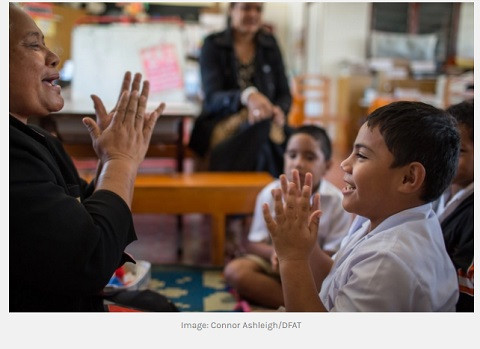
GCED Basic Search Form
Quick Search
You are here
News

By Rachel Brody, Global Director, Programmatic Partnerships and Inclusive Education, Teach For All
Inclusive education is at the core of our collective vision at Teach For All—a world where educators, policymakers, parents, and students are working together to ensure that all of their communities’ children have the foundation they need to shape a better future for themselves and all of us. The 2020 GEM Report on Inclusion and Education is rooted in the premise that “education systems are only as inclusive as their creators make them”. Across our global network of organizations in 53 countries, we have seen the enormous amount of effort required in reimagining education and un-learning systems of oppression, listening to communities, and evolving mindsets, skills, and knowledge to be able to create inclusive settings that truly open up opportunities for us to learn with and from every student.
Over the past several years, one of the key focus areas for our collective learning has been on the topic of education that is inclusive of all learners. In partnership with the Oak Foundation Learning Differences Programme, we launched a Fellowship to bring teachers and teacher coaches together to explore how to create more inclusive learning environments. After several iterations of this Fellowship, in 2019 we conducted a global scan—a survey and individual interviews—in which we engaged with teacher trainers and developers, teachers, and students from across our global network in order to learn more about the progress they are making towards creating inclusive learning environments for students from marginalized communities who also have intellectual and/or physical disabilities. Similar to the GEM Report, we learned that while there are many barriers and obstacles to be addressed, we are also seeing the implementation of innovations and practices that are supportive of inclusion.
Two components that we found to be strong contributors to our network partners’ inclusive education agendas are deep partnerships with ministries of education and programmes like the Erasmus+ of the European Union that are placing inclusive education at the centre of their own priorities. In Estonia, for example, Teach For All network partner Noored Kooli hosted a national conference on Universal Design for Learning in partnership with a local university, the Estonian Ministry of Education, and UDL-IRN. This led to a country-wide focus on re-imagining how education is structured so that students are able to engage, reflect, and develop understanding in ways that are more supportive of how they learn and give them more autonomy and choice in their learning.
From Inclusive Education to Real Scale Transfer (FIERST)—an Erasmus+ co-funded project—is working with organizations, including Teach For All partners in Bulgaria, Estonia, and Romania, to be leaders in the discussions of inclusive education in their countries, and their work and learning has been shared across Europe. In Romania, the project is supporting the creation of communities of practice in local schools that bring together teachers, community members, and school leaders to not only learn about, but actually experience, pedagogical approaches—such as culturally sustaining pedagogy and metacognitive practices—that can support them to build more inclusive environments.
One of the practices that our network is finding critically important for inclusive education is the pursuit of a broader set of student outcomes, including proficiency, agency, dispositions, and awareness. We are continuing to learn that a deep focus on awareness—understanding the social, political, and cultural context in which students learn and grow, including cultural identities and systemic injustices—and agency—taking responsibility for one’s learning and believing in one’s ability to determine a life path and impact others—are critical and in supporting the whole learner. These two areas of focus are important in inclusive education as they are centred in who the learners are and how they learn.
A few specific methods that network educators are using to support students’ awareness and agency and create learning environments where we can learn with and from every learners are Universal Design for Learning, Culturally Sustaining Pedagogy, and Metacognitive Practices. In order to deepen our understanding of these three methods and their impact on teachers and students, Teach For All has developed our Fellowship to focus deeply on these three methods, specifically when supporting students with disabilities and learning differences from marginalized communities.
The Fellowship supports teachers and teacher coaches to first engage in an interactive online course to explore each of these methods. Then, each Fellow uses an action research framework to create a project (like this one) with their local school or community to implement inclusive practices in their context and then share their learning locally and globally via the Fellowship cohort and broader Teach For All network.
Given the pandemic, our upcoming Fellowship will be fully virtual and is open to educators within and beyond the Teach For All network. The Fellowship launches in August, and we invite any teachers and teacher coaches to join, so more practitioners can learn together about how to ensure a truly inclusive education for all learners. If you’re interested in joining, please email rachel.brody@teachforall.org
URL:
